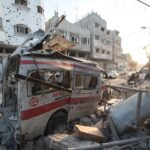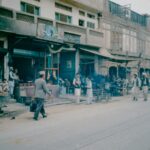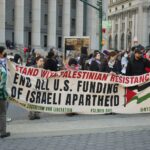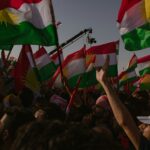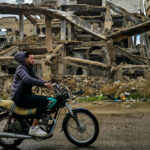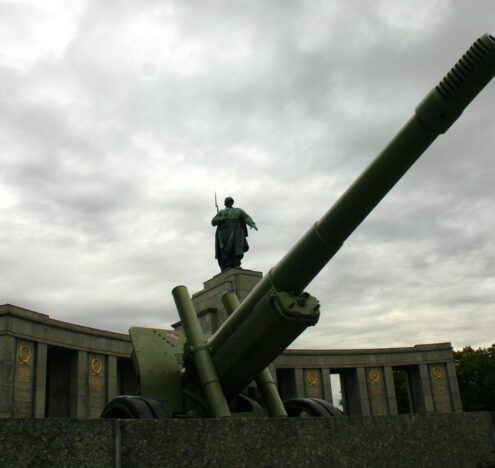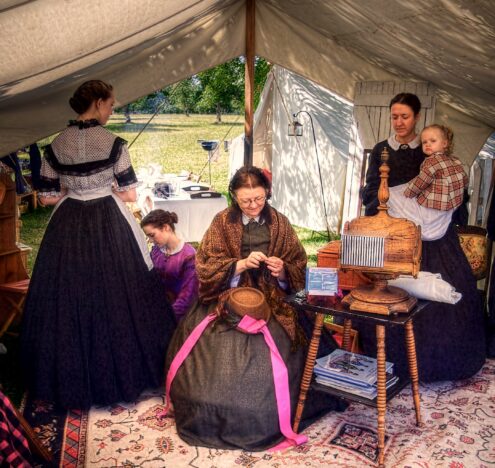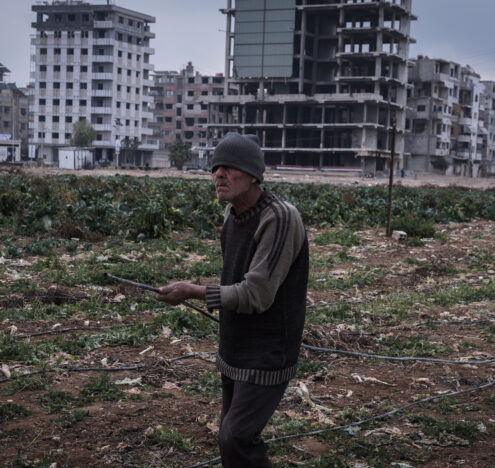After thudding down a dozen stone steps and through the arch of Damascus Gate, Jerusalem’s Old City reveals itself. The wheels of small motorized carts circle over centuries-old pathways and electric scooters zip by some of the holiest sites in Christianity, Islam, and Judaism. According to biblical scripture, this is where Jesus and the prophets Abraham, David, and Solomon once lived; while the Islamic prophet Muhammad’s Night Journey linked the holy city of Jerusalem with Mecca.
For centuries, Jerusalem has been an ethno-religious melting pot, as well as a crossing point for travelers and pilgrims. Today, tens of thousands of Palestinians reside in the Old City that Israel occupied when it seized East Jerusalem from Jordan in 1967. The wider Jerusalem area has a population of one million — approximately 40% of whom are Palestinian.
Christian and Muslim Palestinian residents of occupied East Jerusalem are facing an increasing risk of eviction through opaque property deals and legal proceedings brought by pro-settler groups seeking to increase the Jewish presence in the historic city. Since the war in Gaza began last October, the Israeli government has backed settlement activity that has accelerated across East Jerusalem, fracturing Palestinian communities and threatening the territory’s viability as a capital for a future Palestinian state.
“Geopolitical Issue”
Israeli-American lawyer and activist Daniel Seidemann describes the settlement activity in and around the old city of Jerusalem as “biblically motivated” and focused on “locations that from the perspective of the settlers resonate with biblical history.”
These sites include: the Old City itself, where the Al-Aqsa Mosque compound lies and which holds importance for Jews as the site of the Temple Mount; the Mount of Olives, where Jesus prayed before being betrayed by Judas, and where according to the Hebrew bible, the resurrection will begin; Silwan, where Jesus healed a blind man but where the settler group Elad argue, on dubious grounds, that the ancient City of David lies; as well as the middle-class Palestinian neighborhood of Sheikh Jarrah, where several Palestinian families have faced routine evictions in recent years.

“The goal of this [plan] is to surround the Old City with settlement and settlement-related activities in a way that fragments Palestinian East Jerusalem and establishes or carves into the landscape a very specific Jewish biblical narrative — which most Israelis don’t buy into — and which marginalizes and threaten the Christian and Muslim communities of the city,” says Seidemann, who founded Terrestrial Jerusalem, an organization that tracks development which harms the status and stability of the contested city.
Seidemann believes that the settlement activity will lead to a radical change in the character of Jerusalem, which is “extremely consequential and extremely dangerous.” He says: “This isn’t an interfaith issue. This is a geopolitical issue because the equilibrium of Jerusalem has enormous impact. One of the major factors that contributed to the outbreak of war in Gaza was the religious radicalization of Jerusalem.”
“Redline” Issue
Leaders of the militant group Hamas cite far-right ministers’ visits to Al-Aqsa Mosque and settlement activity as their motivation for “Operation Al-Aqsa Flood,” the deadly surprise attack fighters launched in southern Israel on Oct. 7.

Mounir Dirini, 63, a Palestinian who lives in Sheikh Jarrah, and who had a Molotov cocktail thrown at his home one night shortly by a young settler after the Oct. 7, said attacks and interference in Al-Aqsa is “a redline” issue for Muslims not just in Palestine but around the world.
Courtroom Battles
Pro-settler groups have routinely used legal tactics to uproot Muslim and Christian residents of the Old City. Multiple properties owned by Muslim and Christian residents have become embroiled in opaque transactions often involving shell companies which sometimes lie dormant for years before groups aligned with settlers take legal action to force possession through the Israeli courts.
In 2018, Israeli police and settlers took control of the Petra hotel, after an 18-year-long legal challenge between the Greek Orthodox Patriarch and the settler group Ateret Cohanim. The group’s website says: “The glorious victory in the Six Day War in 1967 and our return to the Old City facilitated the building of a beautiful Jewish Quarter (13% of area). Yet we are still a minority in ‘Our Jerusalem.’”
The Christian Armenian community’s future in the Old City is now under threat after its local religious leader, known as a patriarch, Nourhan Manougian, entered into a controversial deal in 2021 to lease a large tract of church land currently used as a carpark and for several homes to Xana Capital, a UAE company owned by an Israeli-Australian property developer who plans to build a hotel.

The Armenian presence in Jerusalem dates back over 1,600 years. “There were contacts between Armenia and Palestine even before Christ, and the Cathedral of St James — which stands today at the heart of Jerusalem’s Armenian community — was founded around 420 AD,” says Matthew Teller, author of “Nine Quarters of Jerusalem.”
Like Palestinians in the Old City, Armenians are technically stateless and deemed residents rather than full citizens of Israel.
“Surge in Hate Crimes”
Late last year, some 30 masked settlers descended on the carpark at the center of the deal and attacked members of the Armenian community who had been manning a 24-hour watch at the site for fears it would be taken-over by Xana Capital if they didn’t.
In a statement last year, the heads of the historic churches in Jerusalem said: “the provocations that are being used by the alleged developers to deploy incendiary tactics threaten to erase the Armenian presence in the area, weakening and endangering the Christian presence in the Holy Lands.”
Seidemann says the last year and a half has seen “a surge in hate crimes against Christians and it’s getting worse,” adding: “Jerusalem is morphing into a place that is no longer hospitable to Christianity.”

In September, proceedings will begin in an Israeli court over who owns the large tract of land in the Armenian quarter. “We know it’s an uphill battle, but we are confident in our abilities, in the strength of our movement, ” says Kegham Balian, an Armenian Jerusalemite.
Balian has participated in the campaign to protect the car park site, which he believes should become affordable housing for young families from his community unable to keep apace with the soaring cost of living in Jerusalem.
Settlements Spike Amid Gaza War
Since October 2023, government-backed housing projects in East Jerusalem have continued at an unprecedented rate. The government has approved or moved forward thousands of housing units — which, as permanent settlements in occupied territory, are illegal under international law.
These government-backed developments are predominantly ringfenced for Jewish Israelis and some are being devised in partnership with right-wing nationalist groups such as Ateret Cohanim, which did not respond to a request for comment.
“This is not a random compendium of events. It’s a plan with a budget that I can attribute to a line in an official Israeli government budget,” says Seidemann. “The settlers are more than empowered — they are in power. They’re not being helped by the government — they’re in concert with government.” In the wartime budget the Israeli parliament passed in July, some $80,197,144 went to the Settlements and National Projects Ministry.
The Latin Patriarch of Jerusalem, who is the bishop for Latin Catholics in Israel, the Palestinian territories, Jordan, and Cyprus, has been heavily involved in diplomatic outreach to protect the character of Jerusalem and the Christian communities there. There are now attempts underway to build an international coalition of European Union member states, along with the Vatican and the Church of England. Egypt and Saudi Arabia also have an interest in protecting Jerusalem’s Islamic sites, including Al-Aqsa Mosque.
“Transformation”
In the past, Jerusalem’s historic churches would have directly engaged the Israeli government. In recent years, however, that task has become increasingly difficult as the Israeli right courts conservative US evangelicals for support.
Some Evangelicals believe that god has given Israel to the Jewish people as their homeland, while others view the existence of a Jewish state in the holy land as part of a biblical reading that prophecies that Jesus will return to earth during a battle that will end the world as we know it and usher in a new kingdom that will last 1,000 years. “The transformation of Jerusalem to a Jewish city aligns with Christian Evangelical ideology which focuses on ‘the rapture’ and ‘the end of days’,” says Seidemann. “Jerusalem is an Armageddon playground for Evangelicals.”
For his part, Teller says the city’s “diversity has ensured its survival.” He adds, “Jews were always a part of that mix. But the efforts we see today to suppress minorities and Judaize Jerusalem are both immoral and ahistorical. The city’s history demonstrates that this sort of narrow-minded triumphalism has always failed, and will fail again.”
Top photo: A photo shows the path to the Al-Aqsa Mosque in East Jerusalem (Levi Meir Clancy via Unsplash)




